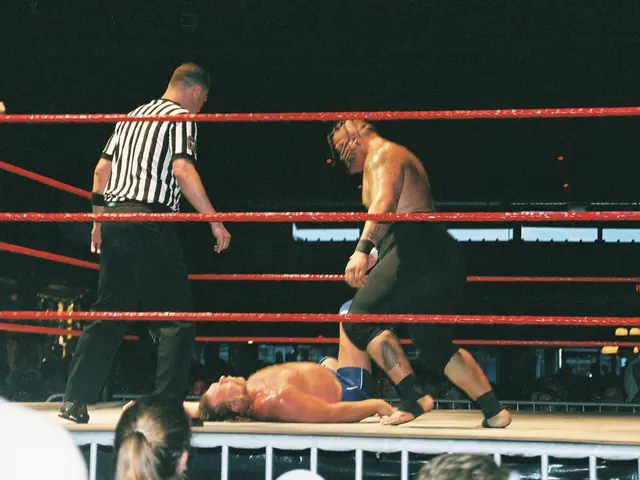Australian Prime Minister secures second term, according to domestic broadcasters' projections
Australia's incumbent Prime Minister, Anthony Albanese, has secured another term in the country's hotly contested election on the weekend, according to local broadcasters. The conservative coalition, led by Peter Dutton, faced a crushing defeat in the polls, attributed to their close association with former U.S. President Donald Trump.
With early projections from the Australian Electoral Commission, the Labor Party surged ahead of the conservative Liberal-National coalition, potentially grabbing more than 70 of the 150 House seats. Dutton, graciously conceded defeat, even though the final count may still require Albanese to forge a coalition government to achieve a majority in Parliament.
Independent candidates and minor parties are projected to take around 13 seats in Parliament. This means Albanese might need to strike a coalition deal if the final count reveals that his party falls short of a majority.
Key issues in the election were Australia's soaring cost of living and a scarcity of affordable housing. At a time when interest rates remain high, these concerns dominated the political landscape. Geopolitical relations with China, Australia's largest trading partner, also captured voters’ attention.
However, Trump's shake-up of the global order with a new, unconventional trade regime, which imposed a 10% tariff on all Australian exports to the U.S., was a significant constituency concern. A survey published by the Lowy Institute revealed that over 60% of Australians did not trust the U.S. to behave responsibly.
Albanese, aged 62, entered the top job in 2022, ending nine years of conservative rule. Acting on his working-class credentials, the Labor party in this election pledged tax cuts, aid for first-time homebuyers, and an additional $5.5 billion for healthcare.
Despite facing a premature exit from office due to high inflation, a sluggish economy, and a housing crisis exacerbated by his expensive cliff-top home purchase, Albanese managed to rally support in the election.
Having been the front-runner against Albanese until recently, Dutton's popularity plummeted when his party's campaign promises on immigration took on a Trump-like quality, emulating Trump's Department of Government Efficiency (DGE). In the final stretch of the campaign, Liberal Party insiders told Reuters that anti-Trump sentiment was driving risk-averse voters to abandon Dutton at the polls.
Critics argued that Trump was a destructive force for Australia's conservative coalition. Andrew Carswell, former press secretary to Liberal Party Prime Minister Scott Morrison, who lost office in the previous election, told Reuters that Trump had been "a wrecking ball" for the conservative movement.
While Albanese generally avoided criticizing Trump on the campaign trail, he warned voters against a "volatile government." Despite his reluctance to criticize Trump, he has made efforts to form a security alliance with the U.S. – albeit absent from Trump's inauguration and yet to visit Washington.
A YouGov poll predicted a Labor majority, expecting the party to win up to 85 seats in the 150-seat lower house, translating to a net loss of 11 seats for the opposition, representing their worst performance since 1946. Albanese's win closely follows Canada's political comeback, with Prime Minister Justin Trudeau overturning Trump's controversial stance on making Canada the 51st U.S. state.
Voting in Australia is compulsory for citizens aged 18 and older. Approximately 4.8 million of the estimated 18 million eligible voters cast their ballots early, with the majority of postal votes expected to be counted after election day.
- The Labor Party, led by Anthony Albanese, secured another term in Australia's election, according to local broadcasters.
- The conservative coalition, led by Peter Dutton, faced a crushing defeat in the polls.
- The Liberal-National coalition may still need Albanese to forge a coalition government to achieve a majority in Parliament.
- Independent candidates and minor parties are projected to take around 13 seats in Parliament.
- Soaring cost of living and a scarcity of affordable housing were key issues in the election.
- At a time when interest rates remain high, these concerns dominated the political landscape.
- Geopolitical relations with China, Australia's largest trading partner, also captured voters’ attention.
- Trump's trade regime imposed a 10% tariff on all Australian exports to the U.S., causing concern among Australians.
- The Lowy Institute published a survey revealing that over 60% of Australians did not trust the U.S. to behave responsibly.
- Albanese, aged 62, entered the top job in 2022, ending nine years of conservative rule.
- The Labor party pledged tax cuts, aid for first-time homebuyers, and an additional $5.5 billion for healthcare.
- High inflation, a sluggish economy, and a housing crisis caused by Albanese's expensive cliff-top home purchase were concerns during his premiership.
- Dutton's popularity plummeted when his party's campaign promises on immigration took on a Trump-like quality.
- Anti-Trump sentiment was driving risk-averse voters to abandon Dutton at the polls.
- Trump was a destructive force for Australia's conservative coalition, according to critics.
- Andrew Carswell, former press secretary to Liberal Party Prime Minister Scott Morrison, described Trump as a "wrecking ball" for the conservative movement.
- Albanese generally avoided criticizing Trump on the campaign trail, but warned voters against a "volatile government."
- Albanese has made efforts to form a security alliance with the U.S., but has yet to visit Washington.
- A YouGov poll predicted a Labor majority, with the party expected to win up to 85 seats in the 150-seat lower house.
- The opposition is expected to suffer a net loss of 11 seats, representing their worst performance since 1946.
- Albanese's win closely follows Canada's political comeback, with Prime Minister Justin Trudeau overturning Trump's controversial stance on making Canada the 51st U.S. state.
- Voting in Australia is compulsory for citizens aged 18 and older.
- Approximately 4.8 million of the estimated 18 million eligible voters cast their ballots early.
- The majority of postal votes are expected to be counted after election day.
- In the world of trading, interest rates and inflation play significant roles.
- The economy and economic policies were central topics during the election campaign.
- Despite Albanese's victory, the issues of inflation and a sluggish economy remain challenges for the new government.
- In the realm of casino-and-gambling, trends indicate a growing interest in casino-games, slots, and lotteries.
- The city of Las Vegas, synonymous with casino-culture, has a rich history and numerous myths associated with it.
- Casino-personalities like Michael Jordan, Matt Damon, and Tiger Woods are known for their big-wins and involvement in casino-games.
- Policy-and-legislation regarding casino-and-gambling, responsible-gambling, and skills-training are important considerations in the casino industry.
- Crime-and-justice, accidents, fires, and other general-news related to car-accidents, casinos, and sports, such as football, baseball, and hockey, are often covered in the media, highlighting the interconnectedness of various aspects of life, including politics, economics, and entertainment.










